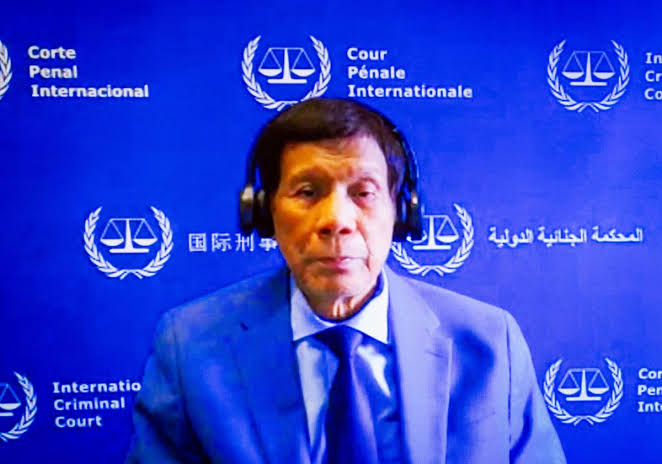Duterte to remain in detention as ICC denies request for temporary release
Paulo Gaborni October 11, 2025 at 09:34 AM
The International Criminal Court (ICC) has denied former Philippine President Rodrigo Duterte’s request for an indefinite suspension of proceedings and temporary release, ruling that his continued political influence and his daughter’s public threats to “break him out” of detention show he remains a flight risk and could obstruct justice.
The decision, dated September 26 but made public on Friday, marks a major setback for the Duterte family’s efforts to bring the former leader home. It also vindicates the position of victims’ families and human rights lawyers who opposed his release, arguing that he still poses a threat to witnesses.
In its ruling, the ICC’s Pre-Trial Chamber I stated that Duterte’s detention remains necessary “to ensure his appearance in these proceedings, that he does not obstruct or endanger the investigation or the Court’s proceedings, and to prevent the commission of related crimes within the jurisdiction of the Court.”
The court rejected all conditions proposed by Duterte’s defence team — including electronic monitoring and supervision by a third country — stating that none could sufficiently contain the risks if he were released.
Influence and Family Support
Judges cited Duterte’s “rejection of the proceedings” and his family’s “will to help him elude detention and prosecution” as key reasons for denying temporary release.
They also noted several public statements by Vice President Sara Duterte, who in July vowed to “break [her father] out” of detention and accused both the ICC and the Philippine government of using “fake witnesses.”
The vice president later said in August that her father hoped to return to Davao City if freed — a comment the court said contradicted the defence’s claim that Duterte would remain in a host country under court supervision.
These remarks, the chamber found, “reinforced the view that the elder Duterte still commands loyalty and political power strong enough to undermine future proceedings.”
That influence, the court added, was evident when Duterte was re-elected as Davao City mayor in May — returning him to the post where many of the alleged drug war killings occurred. His son, now vice mayor, and his daughter’s position as vice president provided “the necessary political contacts… that may help him abscond,” the court said, signed by Presiding Judge Iulia Antoanella Motoc and Judges Reine Adélaïde Sophie Alapini-Gansou and María del Socorro Flores Liera.
Risk to Witnesses and Obstruction
The judges concluded that Duterte’s continued detention was also necessary “to prevent obstruction of proceedings.”
They cited his “repeated history” of interference with investigations, including “alleged involvement in briefing a witness due to testify before the Philippines Senate’s inquiry into the Davao Death Squad” and “threatening and taking retaliatory actions against individuals opposed to him.”
“Releasing Duterte would provide him with greater access to his associates and family who are actively attempting to interfere with the proceedings against him,” the decision read.
The chamber also found “a risk that Mr. Duterte would pose a threat to (potential) witnesses, either directly or indirectly through his supporters.”
Even if released abroad, the court said the risk would persist, as his son’s current role in Davao City “continues to enable potential intimidation of witnesses.”
Risk of New Crimes
The judges also determined that Duterte’s continued detention was necessary to prevent further crimes.
“Should he return to Davao City, Mr. Duterte would be placed in the very position that allowed him to commit the crimes for which his arrest and surrender to the Court was initially sought,” the ruling stated.
Prosecutors submitted evidence that Duterte “reportedly pledged to ‘double’ the killings” during his 2024 mayoral campaign — comments the judges said underscored the risk of new crimes even outside the Philippines.
Health Arguments Dismissed
Duterte’s defence cited his age — 80 — and alleged cognitive decline as reasons to grant release. But the ICC dismissed these claims as “purely speculative and without basis.”
The court said the defence lacked medical expertise to assert that Duterte’s condition neutralised the risks he posed.
“The medical documents submitted by the defence… do not show how Duterte’s condition would eliminate the risks,” the ruling said.
Release Proposal Rejected
The defence’s offer of 16 conditions for release — including electronic monitoring, communication restrictions, and limited movement — was deemed unworkable.
The unnamed third country proposed to host Duterte lacked infrastructure for electronic monitoring, which the defence itself described as “essential to mitigate the risk of flight.” Some terms would also require extensive involvement from the ICC Registry, raising concerns over implementation.
“The Chamber finds that the proposed conditions are not sufficient to mitigate the risks enumerated above in relation to Mr. Duterte’s interim release,” the court ruled.
The confirmation of charges hearing, initially set for September 23, has been postponed. Independent medical experts are currently assessing whether Duterte is fit to participate in proceedings — a separate issue from his bid for interim release.
